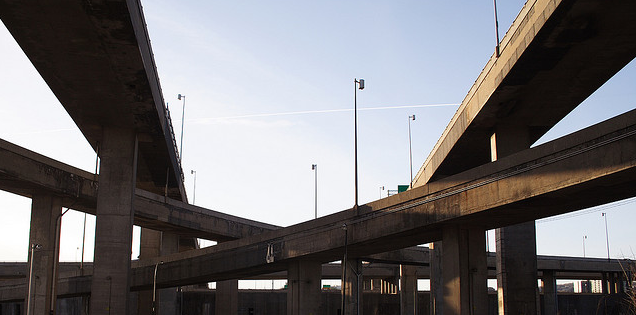Montrealers live life dangerously. They take risks everyday by simply walking down the street or driving through the Turcot interchange for a little trip to Ikea. It’s thrilling really. Even parking — not the action of parking but being parked — can turn into an adventure involving cars being swallowed by sinkholes. Or, a walk to class can become an exhilarating water slide down the street wherein the building of a dam ensues.
The sinkhole at the Trudeau airport that partially swallowed two cars did not come as a surprise. In fact, I’d go so far as to say that when a water main broke on Jan. 28 releasing 40 million litres of water down McTavish St., that was not a surprise either. Are we ever really surprised? When a block of cement falls from a bridge through someone’s windshield? When a 25-tonne slab of concrete falls onto the Ville-Marie highway? Or similarly, when in 2000, an overpass killed five people? That one was disconcerting.
The city keeps emphasizing a need for gentrification but there isn’t much talk about fixing what is behind the scenes. Roadwork has become synonymous with patchwork. Parts of Montreal’s underground water system, indeed, date back to the early 20th century. Thankfully, as part of a billion-dollar project, pipes and underground water systems are set to be repaired in the next 10 years.
Even Montreal’s 2012 municipal budget acknowledged the “decades of neglect” justifying its plans to go from $265 million in its spending to $1.5 billion.
“We have spent billions and billions of dollars since the end of the ‘80s, early ‘90s on our infrastructure. Do you find there is much improvement at all?” said Toronto Sun journalist Brigitte Pellerin at a conference organized the Fraser Institute on March 23.
What with the Charbonneau commission, I think we’ve all figured out where the money’s been going (down a sinkhole along with the noses of those two cars). We’ve gotten so used to this dangerous lifestyle that we don’t have the energy to confront. Proof is the Charbonneau commission was brought about after a series of really good journalistic investigations were made, namely, by La Presse.
Yes, media is society’s voice, but it is moderated, malleable and not a perfect two-way form of communication. Granted, our government hasn’t exactly been transparent about its spending, but isn’t that something that we should be questioning by ourselves? That’s why I think, although radical, it’s healthy to have people protesting in the streets despite the fact that it doesn’t always represent widespread views.
I can just imagine city officials pacing in their office with sudden bursts of energy:
“OK! Infrastructure. What do we do about that one, Gérald?”
“What do we usually do?”
